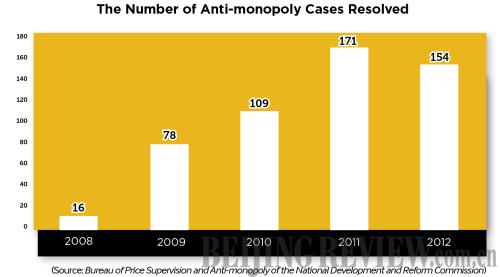|
Shang Ming, Director of the Anti-monopoly Bureau of the Ministry of Commerce (MOFCOM), notes that previous cases mostly involved the manufacturing industry—petroleum, chemical, machinery manufacturing, automobile, shipping, aircraft and mining—and monopolies were always realized through equity mergers, so the public felt little of the anti-monopoly campaign.
Currently, China's anti-monopoly institutions have intensified probes into price-fixing cases closely linked to the goods purchased by Chinese everyday. "Now, enforcement of the Anti-monopoly Law has been put on track, and further progress is expected to be made this year," said Shang.
"At present, the focus should be on the internationalization of law enforcement," says Ren Tengfei, an expert from the International Technology and Economy Institute at the Development Research Center of the State Council.
Ren adds that China is in a new round of technological and industrial revolution, which is full of development opportunities. Competition in IT, new energy and new material is becoming increasingly fierce, and renewed monopolistic practices are emerging.
For instance, due to the complexity of shareholding, coalitions between multinationals have made it much more difficult than ever to spot monopolistic practices.
"The internationalization of anti-monopoly law enforcement is a general trend. Only by taking step with the world can breakthroughs be made in the field and the Chinese market be effectively administered," said Ren.
Shang suggests that China has strived to enhance exchanges and cooperation with the international community in recent years. The country has signed a memorandum of understandings (MOU) with the United States, the European Union (EU) and South Korea, among others.
On September 25, 2012 heads of anti-monopoly institutions under the MOFCOM, the NDRC and the State Administration for Industry and Commerce along with the U.S. Federal Trade Commission and the Department of Justice held a dialogue on Sino-U.S. anti-monopoly cooperation in Washington, marking a new stage in the Sino-U.S. alliance on the issue.
"During such high-level talks, the two countries made exchanges on supervision, technology and specific cases," says Shang. "As exchanges between China and the United States and the EU continue to deepen, attempts have been made to exchange information in handling cross-border mergers and acquisitions. However, as such cooperation always involves confidential information, countries are cautious about technological cooperation. It's feasible only when related laws are complete and secrecy provisions are observed."
Besides cooperation with the United States and the EU, the MOFCOM has also established ties with counterparts in other countries, signing MOUs on Anti-trust and Anti-monopoly Cooperation with Britain and South Korea.
China also attends intergovernmental expert group meetings hosted by the United Nations Conference on Trade and Development and anti-monopoly meetings convened by Asia-Pacific Economic Cooperation and Organization for Economic Cooperation and Development.
"By attending these meetings, China is well informed of what happens in the fight against monopoly and can publish its recent progress in the field," said Shang.
Email us at: lanxinzhen@bjreview.com

| 